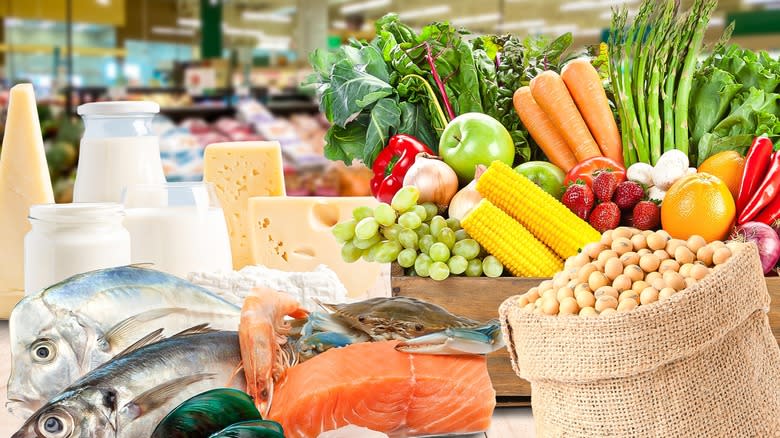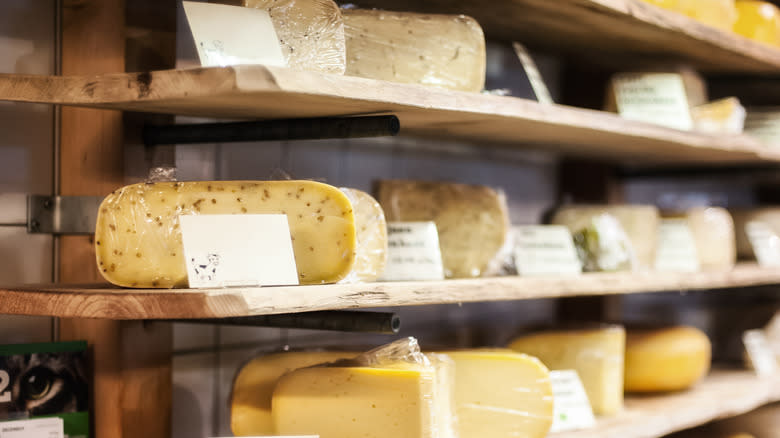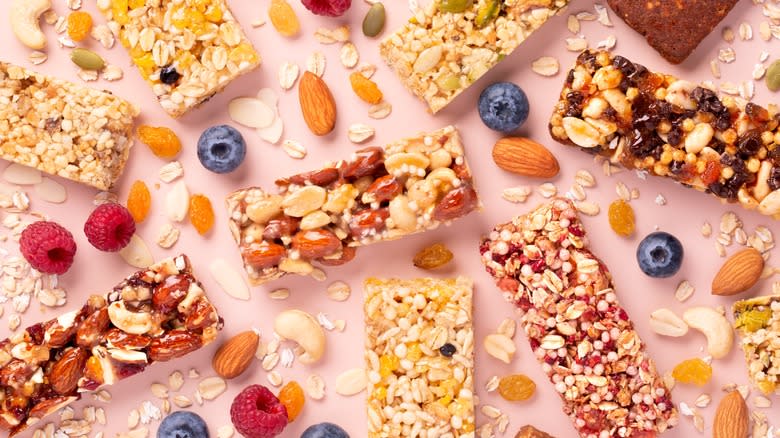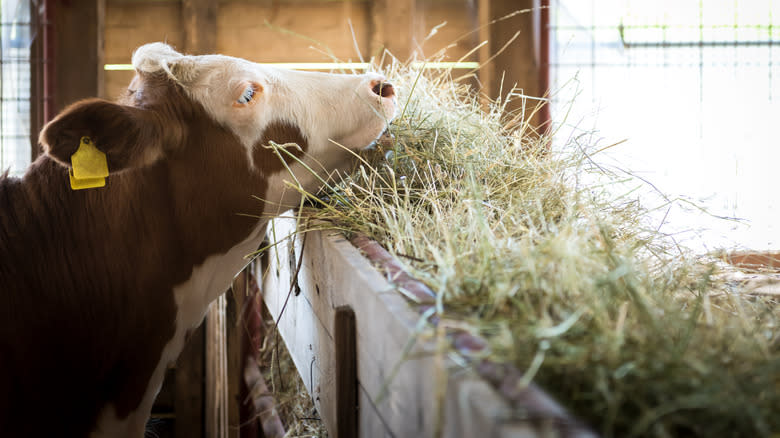A Quick Guide To The Types Of Groceries You Can Find At A Health Food Store

We all look for ways to live healthier lifestyles, but that concept sometimes seems elusive or subjective — not to mention time-consuming and expensive. Fortunately, there's a simple way to turn the health wheel in the right direction, and it involves something we already do in the course of daily life: grocery shopping.
Choosing where we buy our weekly fresh veggies, meats, cheeses, and snacks is arguably easier than ever, thanks to nationwide chain grocers doling out competitively priced goods from across the country. But some savvy shoppers believe that today's health food stores offer way more choices for the health-conscious consumer — especially when it comes to fresh local foods, unique regional specialties, freshly baked breads, sustainable food practices, fewer additives, and more.
While health food stores carry a reputation for higher costs, that can vary depending on which markets you choose. Many communities have mom-and-pop venues, local co-op grocery stores, or sometimes nonprofits that lean toward healthier options. Larger cities often boast health food chains such as Whole Foods and Sprouts Farmers Market. Prices vary widely, so it's important to gauge the return in value regarding your health and a richer, more varied approach to eating.
Understanding what's available inside the doors of local health food stores may illuminate some options for how you shop and eat. Here's a look at what's perched on those shelves, packed in those freezers, buried in bulk containers, stacked on snack and supplement shelves, and displayed behind the deli and bakery counters.
Read more: 23 Whole Foods Baked Goods, Ranked
Fresh Local And Organic Produce

The obvious place to start when exploring the shopping benefits of any grocery store is the fresh produce section. Almost every standard market has one, so how is it different inside a health food store?
First and foremost is the higher possibility of finding local produce, rather than fruits and veggies that have traveled vast distances to reach your shopping cart and your kitchen. Not only do freshness and nutrition decline with each passing mile, but it's also more likely that big box produce has been picked before fully ripe to withstand the extended hours and days from field to table.
Your local health food store is also more likely to carry an abundance of certified organic, non-GMO, and reduced-pesticide fresh produce, often at similar prices to their aging counterparts in standard supermarkets. And because smaller health food stores can sometimes restock more easily from local farmers and suppliers, they can buy in smaller quantities for consistent and ongoing fresh goods. Specifics will vary by region — you're more likely to find specialties such as black-eyed peas in Southern states, Rainier cherries in the Northwest, and rhubarb or mushrooms in the Northeast. (As a bonus, small food stores' support of local farmers also gives back in terms of jobs, community involvement, and dollars locally re-circulated.)
Nuanced Cheese And Dairy Products

Whether it's dairy-free equivalents or full-on creamy deliciousness in handmade cheeses, fresh creams, and Greek-style yogurts, health food stores generally embrace this segment of foods in a big way. In addition to traditional cow's milk, you'll likely find vegan-friendly almond, soy, and cashew milks sitting happily beside goat and sheep milks. A commonly available product in health food stores is kefir — a fermented milk drink harboring a wealth of protein, calcium, and B vitamins, according to Healthline.
A myriad of cheeses, sometimes from regional fromageries, typically carry labels such as grass-fed, no added hormones, no antibiotics or pesticides, and no artificial colors or flavorings. Organic cheeses can also contain more antioxidants and beneficial vitamins.
Likewise, health-focused stores carry plenty of egg options from chickens that are cage-free, pasture-raised, vegetarian-fed, and more. Some may even be humanely raised and bear a Certified Humane seal or be Animal Welfare Approved. These types of egg distinctions are sometimes available from mainstream grocers, but the wide variety and availability may be less predictable than in health food stores.
Whole Grains And Bulk Nuts, Legumes, And Spices

While standard grocery outlets sell "whole wheat" or multigrain breads and pastas, they may not be the same caliber as "whole grain" products in health food stores. Foods considered to be whole grains are ones that retain the full grain kernel — meaning the germ, bran, and endosperm are intact — with little if any refining. At community co-ops and dedicated health or natural food stores, you'll find plenty of whole-grain versions of everyday items such as hamburger buns, cereals, tortillas, baking doughs, and fresh or hard pastas. For quick, kid-friendly meals, head to the freezer section to snag some premade whole-grain pizzas, waffles, and mac and cheese.
For those who prefer cooking from scratch, health food stores also often allow scooping from bins filled with unrefined barley, buckwheat, whole grain wheat, oatmeal, quinoa, brown and other rice varieties, and grain alternatives such as couscous. Ground flours made with these grains are often available in bulk as well.
Aside from grains, bulk buying in health food stores involves bins brimming with a wide variety of beans, nuts, seeds, dried fruits, granola mixes, and a whole of spices. They'll typically be free from additives such as artificial sweeteners, high-fructose corn syrups, and hydrogenated fats, so you can bypass the things you don't want in your food while also gaining the freedom to buy only the amounts you actually need.
Natural Snacks, Protein Boosters, And Supplements

Some people find healthy snacking to be lackluster and flavor-deficient, but food purveyors are changing that narrative. Many natural food store shelves feature tasty versions of commercial treats, including ones that are fruit-sweetened without excess preservatives and additives. When checking out local options for healthy eating, expect to find plenty of energy bars, protein-packed shakes, and nutrition boosters.
Though health-conscious grocers such as Trader Joe's don't technically identify as health food stores, they're also a good source for this type of eating. In addition to clear labeling, TJs also puts out a Fearless Flyer newsletter (in print and online) giving many nutrient and sourcing details about its fan-fave snack items, including plantain chips, rice cake thins, cleverly named crackers, protein bars, organic chocolates, and lentil curls.
A wide array of vitamins and supplements at natural food stores can help enhance daily nutrition for those following vegan, keto, and paleo diets. You'll also find fiber supplements, probiotics, and botanical compounds for reported benefits such as increased energy and relief from inflammation, insomnia, and more. Smaller health stores may limit the brands they carry, but the high quality could compensate for narrow selections.
Sustainable Seafood, Meat, And Meat Alternatives

Most big box supermarkets have large meat and seafood sections that can outpace health food stores in terms of variety and lower costs, so it's up to shoppers to weigh the pros and cons while establishing standards that meet lifestyle needs. When it comes to meats, ask questions that are important to your decision-making, such as how the animals were raised and fed.
Natural food stores are likely to carry red meats, poultry, pork, and lamb from farms dedicated to grass-fed and pasture-raised animals with limited or no antibiotics and hormones employed in the process. For poultry, it's common to find labels such as air-chilled, a process that uses cooling chambers instead of icy-cold immersion baths to bring meat to federally mandated safety temperatures. (The result of air chilling is chicken that's more flavorful and less prone to contamination and water retention.)
Similar standards apply to seafood as to meats, with sustainable fishing practices and label distinctions such as wild-caught and responsibly farm-raised. Many health food stores prohibit genetically modified and cloned seafood as well as certain artificial colors and preservatives.
You're also likely to find expanded store space for meat alternatives or plant-based versions of burgers, bacon, chicken nuggets, jerky, crab cakes, sausages, and loads more favorite food products. Similarly, your health food store is likely to carry a variety of plant-based prepared sauces, spreads, and yogurt alternatives.
Health Food Store Delis, Baked Goods, And Alcohol

Picking up nutritious, ready-made dinners is a big perk of many natural food grocers. When shopping at a reputable place that meets your standards, it takes the pressure out of monitoring every ingredient — not to mention making it taste good. Cold-food deli counters offer ready-to-go meals, while hot food counters and line bars, common at chains such as Bristol Farms and Whole Foods, let you dish up your dinner from large, steamy pans of veggies, meats, pasta dishes, starches, breads, salads, and desserts. Customers typically pay by the pound, with the ability to choose the portion sizes.
Baked goods and homemade breads — made fresh daily — typically come from in-house chefs or local bakeries. This often eliminates the need for preservatives, stabilizers, and additives.
To accompany those grab-and-go meals from your local health food store, it's likely you can pick up a bottle of natural wine to wash it all down. Your selections may carry labels stating traits such as organic, biodynamic, earth-friendly, low-sulfate, and wild rather than containing lab-manufactured yeasts. The same goes for beer, especially craft beers, which can provide alternatives that are organic and free from gluten and GMOs. Many standards applied to natural wines and beers also apply to sakes and hard ciders, kombuchas, and seltzers that you'll find on health food store shelves.
Read the original article on Tasting Table.

